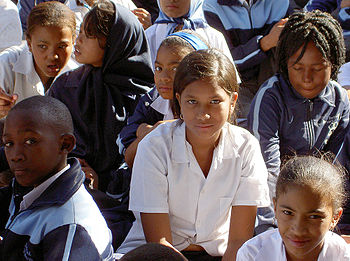Rauner signs Vision 20/20 bill on education & diversity
FOR IMMEDIATE RELEASE
Vision 20/20 gets second bill signed by Governor Rauner
HB2683 will focus on continuous improvement, recognize diversity and eliminate achievement gaps
Passage of this bill marks the 2nd legislative victory for state’s leading education group
CHICAGO (August 2, 2015) – A second legislative bill was signed yesterday by Illinois Governor Bruce Rauner-introduced and passed on behalf of the Vision 20/20 group-ensuring a balanced accountability measure focusing on continuous improvement, recognizing the diversity of struggling schools and aimed at eliminating achievement gaps across the state. The model adopted under HB2683 (now Public Act 99-193) allows local flexibility, promote shared accountability, and is sensitive to local district improvements.
The passage of this bill marks the second legislative victory for a collective group known as Vision 20/20. The group consists of the four largest education associations in Illinois along with the Regional Offices of Education (ROE’s) and the Superintendents’ Commission for the Study of Demographics and Diversity (SCSDD). Just last week, the governor signed a bill (HB 2657/PA 99-58) designed to streamline the licensure process for teachers and administrators and establish reciprocity with other states in order to increase the pool of qualified candidates for positions in Illinois.
The Illinois Balanced Accountability Measure (IBAM) implements an accountability model for schools that in addition to using standardized test scores also provides flexibility for school districts to use an evidence-based framework to demonstrate student improvement and growth. The group worked with the Illinois State Board of Education (ISBE) in arriving at the final agreed-upon language.
“This is the biggest shift in Illinois school accountability since the federal No Child Left Behind Act was implemented 14 years ago. Unlike NCLB, which only took test scores into account, this is truly a balanced accountability model that looks at those scores and achievement gaps, but also takes into consideration a school district’s professional practice to improve student performance,” said Dr. Brent Clark, Executive Director of the Illinois Association of School Administrators (IASA).
Roger Eddy, Executive Director of the Illinois Association of School Boards, considers this to be great news for Illinois schools.
“Our schools provide tremendous programs for our students that the previous accountability model does not take into account. Student achievement on State Assessments in reading and math are important components in accountability,” stated Eddy. “However, we should also consider compliance related to a myriad of state mandates, many unfunded or underfunded, and we should allow school districts the opportunity to describe the numerous outstanding programs they provide for the students in their communities that are currently not part of the accountability system in Illinois.”
Critics have claimed the current model has a “one size fits all” set of standards and doesn’t really reflect a state as large and diverse as Illinois. The adopted model allows for school districts to get credit for programs indicative and valuable to their students and their community. The implementation of the new model will continue to take shape over the next year with a five-year phase-in period beginning with the 2016-2017 school year.
The Regional Offices of Education (ROE’s) oversee the compliance of school districts with state mandates, rules and regulations. The districts are reviewed utilizing the compliance document developed by ISBE. Pat DalSanto, former President of the Illinois Association of Regional Superintendents of Schools, comprised of ROE’s, explains how the new model changes all that.
“Not only are we focused on the compliance of rules and regulations that assure students are safe and instructed in the best educational environments,, we can now evaluate and recognize the local story of priorities and accomplishments” stated DalSanto.
Superintendent Ralph Grimm of Galesburg School District 205 was part of the original group that developed the model and pushed for its adoption through Vision 20/20 and eventually the legislature. According to Grimm, educators across the state worked for months developing the new model and accountability measures. He believes this will change the way schools are held accountable for student performance.
“Throughout this whole process, those of us involved wanted to acknowledge the great work going on in public schools in Illinois. Each school has a story to tell, and the new model will allow schools to do that and be in compliance. This was truly a cooperative effort between education stake holders to make the accountability of school districts more relevant.”
For more information, please visit http://illinoisvision2020.org
About Vision 20/20
The Vision 20/20 initiative began in November 2012 under Dr. Clark’s organization and then partnered with the Illinois Principals association (IPA), the Illinois Association of School Business Officials (IASBO), the Illinois Association of School Boards (IASB), the Superintendents’ Commission for the Study of Demographics and Diversity (SCSDD), and the Illinois Association of Regional Superintendents of Schools (IARSS) to unite the education community and develop a long-range blueprint for improving public education in Illinois.
Vision 20/20’s policy platform reflects educators from across the state and is representative of opinions from the southern tip of Illinois through the northern Chicago suburbs. This vision is the result of input from over 3,000 key stakeholders, discussions with field experts, and a review of current literature on best practices.
Alliance membership includes the following organizations and leaders:
Brent Clark, Ph.D., Executive Director - Illinois Association of School Administrators
Jason Leahy, Executive Director - Illinois Principals Association
Michael A. Jacoby, Ed.D., Executive Director - Illinois Association of School Business Officials
Patricia Dal Santo, Former President - Illinois Association of Regional Superintendents of Schools
Roger L. Eddy, Executive Director - Illinois Association of School Boards
Creg Williams, Ed.D., President - Superintendents’ Commission for the Study of Demographics and Diversity
Contact: Rosemaria DiBenedetto
Cell: 708/712-4629
# # #
Latest posts by admin (see all)
- Ad campaign slams critics of Iran deal - August 20, 2015
- Vision 20/20 joins iTunes U, offering free course content to transform Illinois teaching, learning - August 18, 2015
- Block these scam websites - August 4, 2015










